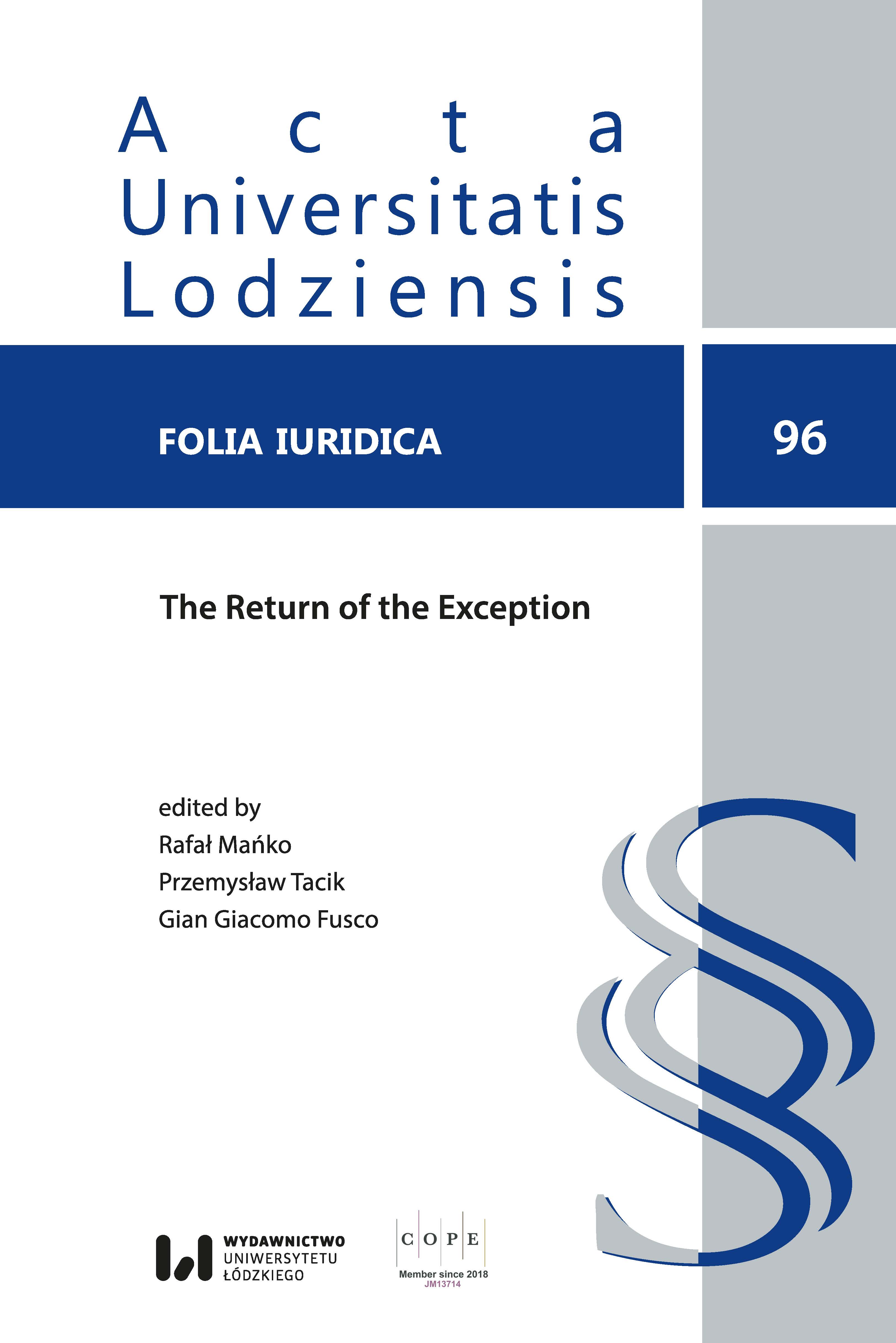Konieczność typologii prawniczych w kryzysie i sytuacji nadzwyczajnej
DOI:
https://doi.org/10.18778/0208-6069.96.06Słowa kluczowe:
wyjątek, sytuacja nadzwyczajna, kryzys, pojęcia prawnicze, typologiaAbstrakt
Analiza prawnicza z konieczności posługuje się pojęciami, rozróżnieniami i typologiami. Narzędzia te napotykają na trudności, gdy przedmiotem analizy lub zastosowania jest kryzys lub sytuacja nadzwyczajna. Artykuł analizuje dwa przykłady typologii prawniczych sytuacji kryzysowych w pracach Grossa i Ní Aiolaín oraz Agambena w ujęciu respektywnym. Na tej podstawie proponuje się cztery poziomy prawniczej analizy odpowiedzi na sytuacje kryzysowe: 1) wyraźne opisy działań samych aktorów, 2) pozytywistyczne kategorie prawne dostępne w danym kontekście, 3) kategorie meta/porównawcze oraz 4) filozoficzne/ontologiczne koncepcje i kategorie, które kwestionują lub badają wszystkie poprzednie kategorie. Artykuł kończy się dyskusją na temat tego, w jaki sposób te poziomy analizy nakładają się na siebie, przenikają i muszą być połączone, aby uchwycić złożone zjawiska prawa w kryzysie.
Pobrania
Bibliografia
Agamben, Giorgio. 2004. “No to bio-political tattooing.” Le Monde, January 10, 2004.
Google Scholar
Agamben, Giorgio. 2005. State of exception. Chicago: University of Chicago Press. https://doi.org/10.2307/j.ctv1134d6w.16
Google Scholar
DOI: https://doi.org/10.2307/j.ctv1134d6w.16
Dyzenhaus, David. 1997. Legality and legitimacy: Carl Schmitt, Hans Kelsen, and Hermann Heller in Weimar. Oxford: Clarendon Press.
Google Scholar
Dyzenhaus, David. 2006. The constitution of law: Legality in a time of emergency. Cambridge: Cambridge University Press. https://doi.org/10.1017/CBO9780511618246
Google Scholar
DOI: https://doi.org/10.1017/CBO9780511618246
Ferejohn, John. Pasquale Pasquino. 2004. “The law of the exception: A typology of emergency powers.” International Journal of Constitutional Law 2(2): 210–239. https://doi.org/10.1093/icon/2.2.210
Google Scholar
DOI: https://doi.org/10.1093/icon/2.2.210
Gross, Oren. 1999. “The Normless and Exceptionless Exception: Carl Schmitt’s Theory of Emergency Powers and the Norm-Exception Dichotomy.” Cardozo Law Review 21: 1825–1868.
Google Scholar
Gross, Oren. Fionnuala Ní Aoláin. 2006. Law in times of crisis: emergency powers in theory and practice. Cambridge: Cambridge University Press. https://doi.org/10.1017/CBO9780511493997
Google Scholar
DOI: https://doi.org/10.1017/CBO9780511493997
Latour, Bruno. 2010. The making of law: an ethnography of the Conseil d’Etat. Cambridge: Polity.
Google Scholar
Lazar, Nomi Claire. 2009. States of Emergency in Liberal Democracies. Cambridge: Cambridge University Press. https://doi.org/10.1017/CBO9780511596704
Google Scholar
DOI: https://doi.org/10.1017/CBO9780511596704
Loevy, Karin. 2016. Emergencies in public law: the legal politics of containment. New York: Cambridge University Press. https://doi.org/10.1017/CBO9781316403556
Google Scholar
DOI: https://doi.org/10.1017/CBO9781316403556
Pirie, Fernanda. 2013. The anthropology of law. Oxford: Oxford University Press.
Google Scholar
DOI: https://doi.org/10.1093/acprof:oso/9780199696840.001.0001
Rossiter, Clinton. 1948. Constitutional dictatorship. Princeton: Princeton University Press.
Google Scholar
Schmitt, Carl. 2004. Legality and legitimacy. Duke University Press. https://doi.org/10.1215/9780822385769
Google Scholar
DOI: https://doi.org/10.1215/9780822385769
Tingsten, Herbert. 1930. Regeringsmaktens expansion under och efter världskriget: studier över konstitutionell fullmaktslagstiftning. Lund: Gleerup.
Google Scholar
Tingsten, Herbert. 1934. Les pleins pouvoirs: l’expansion des pouvoirs gouvernementaux pendant et après la grande guerre. Paris: Librairie Stock.
Google Scholar
Venice Commission. 1995. Emergency Powers – Science and technique of democracy No. 12. Strasbourg: Council of Europe. https://www.venice.coe.int/webforms/documents/?pdf=CDL-STD(1995)012-e
Google Scholar
Pobrania
Opublikowane
Jak cytować
Numer
Dział
Licencja

Utwór dostępny jest na licencji Creative Commons Uznanie autorstwa – Użycie niekomercyjne – Bez utworów zależnych 4.0 Międzynarodowe.














